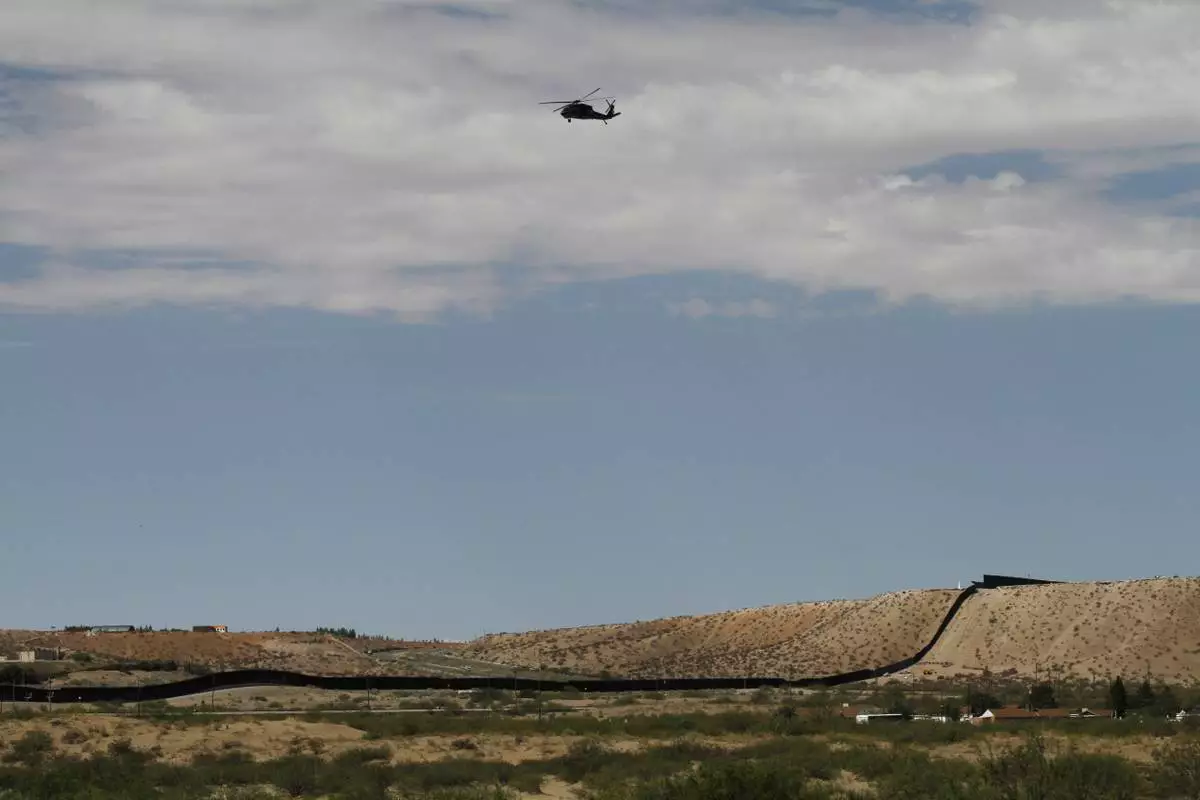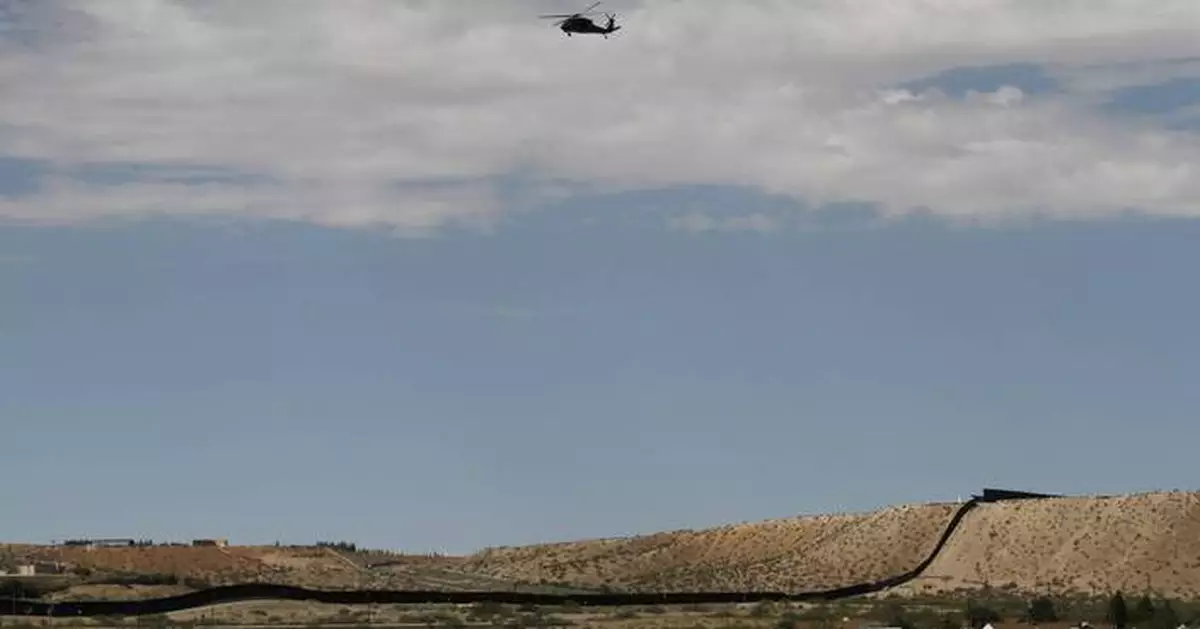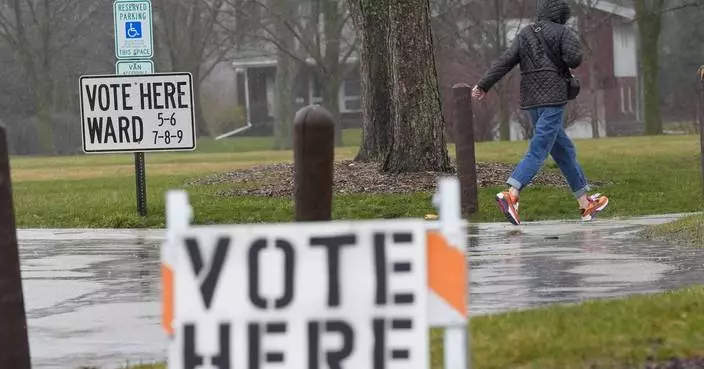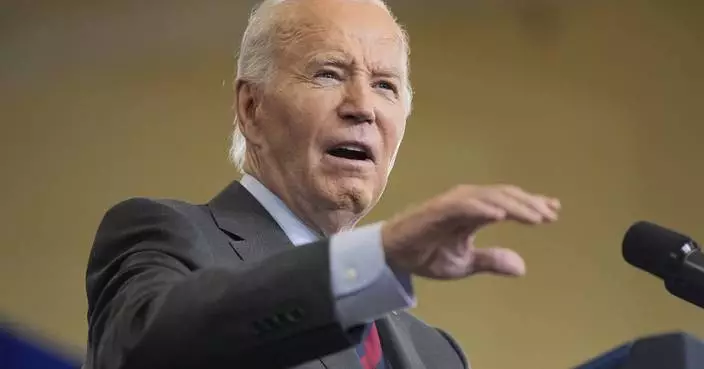SAN DIEGO (AP) — Arrests for illegally crossing the border from Mexico fell 7% in September to a more than four-year low, authorities said Tuesday. It was likely the last monthly gauge during a presidential campaign in which Republican nominee Donald Trump has made immigration a signature issue.
The Border Patrol made 53,858 arrests, down from 58,009 in August and the lowest tally since August 2020, when arrests totaled 47,283, according to U.S. Customs and Border Protection.
Mexicans accounted for nearly half of arrests, becoming a greater part of the mix. In December, when arrests reached an all-time high of 250,000, Mexicans made up fewer than 1 in 4. Arrests for other major nationalities seen at the border, including Guatemalans, Hondurans, Colombians and Ecuadoreans, have plunged this year.
San Diego was again the busiest corridor for illegal crossings in September, followed by El Paso, Texas, and Tucson, Arizona.
For the government's fiscal year ended Sept. 30, the Border Patrol made 1.53 million arrests after topping 2 million in each of the previous two years for the first time.
The White House touted the numbers as proof that severe asylum restrictions introduced in June were having the intended effect, and blamed congressional Republicans for opposing a border security bill that failed in February. Vice President Kamala Harris has used that line of attack against Trump to try to blunt criticism that the Biden administration has been weak on immigration enforcement.
“The Biden Harris Administration has taken effective action, and Republican officials continue to do nothing,” said White House spokesman Angelo Fernández Hernández.
The Federation for American Immigration Reform, a frequent administration critic and advocate for immigration restrictions, attributed recent declines to more enforcement by Mexican officials within their own borders, saying the White House “essentially outsourced U.S. border security to Mexico in advance of the 2024 election — policies that can be reversed at any time that the government of Mexico chooses.”
Arrests fell sharply after Mexico increased enforcement in December, and took a steeper dive after the U.S. asylum restrictions took effect in June. U.S. officials haven't been shy about highlighting Mexico's role.
Mexican authorities are encountering more migrants this year while deportations remain relatively low, creating a bottleneck. Panamanian authorities reported an increase in migrants walking through the notorious Darien Gap during September, though numbers are still well below last year.
Troy Miller, acting CBP commissioner, said last week that the administration is working with Mexico and other countries to jointly address migration.
“We continue to be concerned about any bottlenecks, we continue to look at those, we continue to address them with our partners,” Miller said at a news conference in San Diego.
The Biden administration has promoted new and expanded legal pathways to enter the country in an effort to discourage illegal crossings. In September, CBP allowed more than 44,600 people to enter with appointments on an online system called CBP One, bringing the total to 852,000 since it was introduced in January 2023.
Another Biden policy allows up to 30,000 people from Cuba, Haiti, Nicaragua and Venezuela with financial sponsors to enter monthly through airports. More than 531,000 people from those four countries have entered that way up through September.
Associated Press writer Maria Verza in Mexico City contributed.

A surveillance helicopter traces a line in the sky above the Southwest border with Mexico at Sunland Park, N.M., Thursday, Aug. 22, 2024. (AP Photo/Morgan Lee, File)
HAVANA (AP) — A small town in Cuba was recovering Tuesday from flooding that killed at least seven people after Oscar crossed the island’s eastern coast as a tropical storm with winds and heavy rain.
Cuba's capital was partially illuminated after a large-scale blackout generated a handful of protests and a stern government warning that any unrest would be punished.
President Miguel Díaz-Canel said on state television that rescue and recovery work continued in the town of San Antonio del Sur and officials hadn't yet entered some flooded areas. On Tuesday, he confirmed another death in the small town of Imias in the province of Guantanamo.
People in Havana collected subsidized food Tuesday and said the country faced an intensive recovery period.
“There are lines everywhere you go,” city resident Carlos López said. “You get to a place and there are obstacles and obstacles.”
Tropical Storm Oscar disintegrated as it headed toward the Bahamas after making landfall in Cuba as a Category 1 hurricane. The remnants were expected to drop up to 4 inches (10 centimeters) of rain across the southeastern Bahamas and the Turks and Caicos Islands.
Modesto Hernández, who lives in central Havana, said Tuesday that he and others “don’t know anything about what is going on.”
“These problems need to be solved now,” he said. "We are in bad shape.”
Díaz-Canel warned on national television Sunday that “we're not going to allow any vandalism, or let anyone disturb people's tranquility."
The prolonged nationwide blackout that followed a massive outage Thursday night was part of countrywide energy problems that led to the largest protests in Cuba in almost 30 years, in July 2021. Those were followed by smaller local protests in October 2022 and March 2024.
All are part of a deep economic crisis that has prompted the exodus of more than half a million Cubans to the U.S., with thousands more heading to Europe.
The Cuban government and its allies blame the United States' 62-year-old trade embargo on the island for its economic problems but White House press secretary Karine Jean-Pierre said Monday that the Cuban government’s “long-term mismanagement of its economic policy and resources has certainly increased the hardship of people in Cuba.”
Power remains relatively cheap but increasingly unavailable. The Cuban government on state television Monday night said that it’s producing 1300 megawatts when peak demand can hit 3 gigawatts. Authorities said by Monday afternoon that about 80% of Havana had intermittent power but people remained fearful. Classes remained closed through at least Thursday.
Energy Minister Vicente de la O Levy said Oscar would bring “an additional inconvenience” to Cuba's recovery since it would affect key Cuban power plants, such as Felton in the city of Holguín, and Renté in Santiago de Cuba.
Many of Havana's 2 million people resorted to cooking with improvised wood stoves on the streets before their food went bad in refrigerators. People lined up to buy subsidized food and few gas stations were open.
The failure of the Antonio Guiteras plant on Friday was the latest problem with energy distribution in a country where electricity has been restricted and rotated among different regions at different times.
The blackout was considered to be Cuba’s worst since Hurricane Ian hit the island as a Category 3 storm in 2022 and damaged power installations. It took days for the government to fix them.
Local authorities initially said the outage stemmed from increased demand from small- and medium-sized companies and residential air conditioners. Later, the blackout got worse because of breakdowns in old thermoelectric plants that haven’t been properly maintained, and the lack of fuel to operate some facilities.
Associated Press writer Josh Boak in Washington contributed to this report.
Follow AP’s coverage of Latin America and the Caribbean at https://apnews.com/hub/latin-america

A cook looks in on a resident during a massive blackout after a major power plant failed in Havana, Cuba, Saturday, Oct. 19, 2024. (AP Photo/Ramon Espinosa)

A man walks down the street holding slices of pizza during a massive blackout following the failure of a major power plant in Havana, Cuba, Saturday, Oct. 19, 2024. (AP Photo/Ramon Espinosa)

A person fishes along the boardwalk as waves crash during a power outage in Havana, Monday, Oct. 21, 2024. (AP Photo/Ramon Espinosa)

Residents pass the time at the malecon during a blackout following the failure of a major power plant in Havana, Cuba, Sunday, Oct. 20, 2024. (AP Photo/Ramon Espinosa)

People play dominoes on the street during a power outage in Havana, Cuba, Monday, Oct. 21, 2024. (AP Photo/Ramon Espinosa)

Residents stand outside their homes to avoid the heat indoors during a massive blackout after a major power plant failed in Havana, Cuba, Saturday, Oct. 19, 2024. (AP Photo/Ramon Espinosa)

A woman buys soup from a street vendor during a power outage in Havana, Monday, Oct. 21, 2024. (AP Photo/Ramon Espinosa)

















